London Film Festival 2019, Days 1-2: Horror Gems & Future Cult Classics
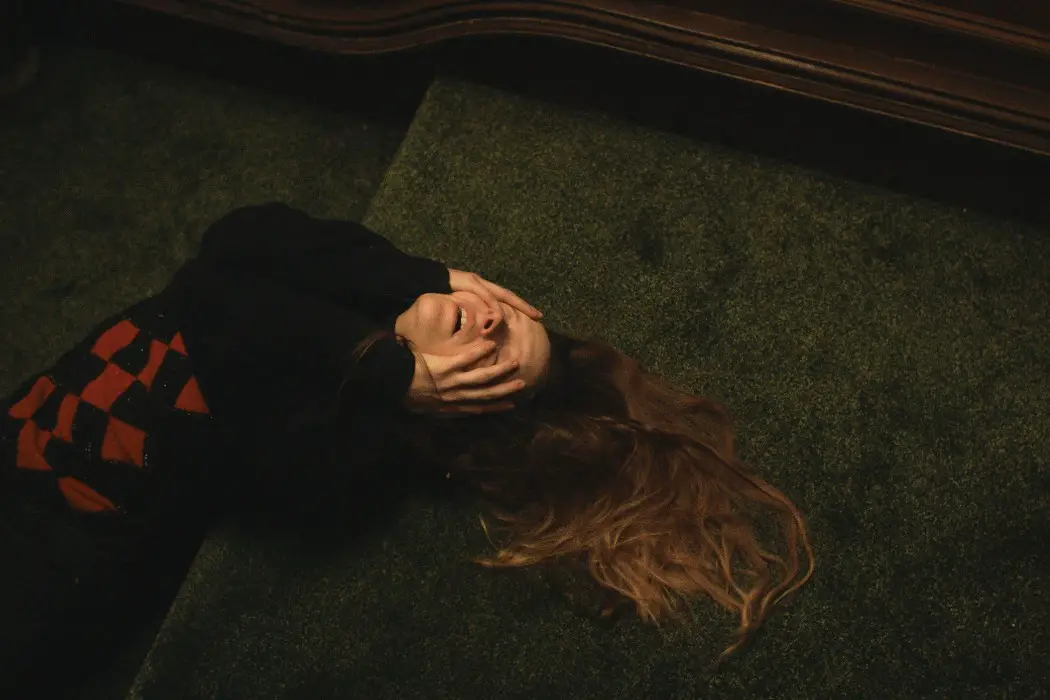
Alistair is a 25 year old writer based in Cambridge.…
This year’s London Film Festival is now in full swing. Here’s some of what the Film Inquiry team has seen so far:
Color out of Space (Richard Stanley)
Faisal Al-Jadir: From an outsider’s perspective, the most fascinating aspect of cinematic adaptations and interpretations of H.P. Lovecraft stories is the lack of clarity we tend to get. Even when we get a reasonable amount of exposition pertaining to what is going on, we never really know the “why” of the matter.
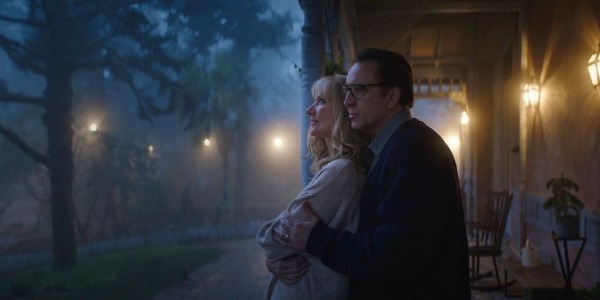
Adapting the Lovecraft short story, director Richard Stanley delights in shrouding Color out of Space in an aura of ambiguity and mystery. While the premise, which revolves around the Gardner family being affected by a mysterious meteorite that crashes in the grounds of their rural estate (after leaving city life), isn’t necessarily unique, it’s Stanley’s mad ambitions that make the experience quite memorable.
Even though Stanley had been trying to mount the project for over a decade, it feels eerily relevant to the aggressive, paranoid atmosphere of the 2010s, almost allegorising the lack of communication and sense of reason that seems to define Trump’s U.S.A and the general horrors of our world. Those familiar with Lost Soul: The Doomed Journey of Richard Stanley’s Island of Dr. Moreau, know that Stanley is no stranger to apparitions, bad omens and the sense of conspiracy and dark forces out to get him, as his ambitious vision of the H.G. Wells classic was stolen and bastardised, only to leave us with a memorable image of Marlon Brando wearing a bucket over his head.
Especially because of the inclusion of a Brando film playing on television, Stanley could almost be poking fun at the infamous ordeal and creating a beautifully unusual metaphor about the perils of reaping what you sow (which isn’t strictly related to Cage’s character being a self-involved amateur of a farmer).
Aside from Nathan Gardner (Nicolas Cage) and his family living outside the town of Arkham, the film lives and breathes Lovecraft, from Cosmic entities distorting the image of an ideal American family life to medieval references and pentagrams threatening to take the world back to the dark ages. With acknowledgements to John Carpenter’s The Thing and Stanley Kubrick’s 2001: A Space Odyssey, the film mixes science fiction with morbid fantasy, delivering us a gothic horror tale of the highest order. It’s all dialled up to eleven, and Stanley isn’t concerned with how disturbing and unsettling it can feel, nor with how insane Cage can get, in what seems like a brilliant reprise of his yuppie character from Vampire’s Kiss.
With plenty of laughs, an abundance of unsettling terror, and a wonderful supporting cast of alpacas, Color out of Space is an effective and intriguing look into the lore and mythology of Lovecraft.
Jalikattu (Lijo Jose Pellissery)
Gus Edgar-Chan: Keralan director Lijo Jose Pellissery takes to his hometown for Jalikattu, a buffalo-on-the-run bloodbath that functions as both a gentle probing of tradition and a rancorous take-down of masculinity. A buffalo escapes slaughter and terrorises a tiny Indian village. That’s it. That’s the plot.
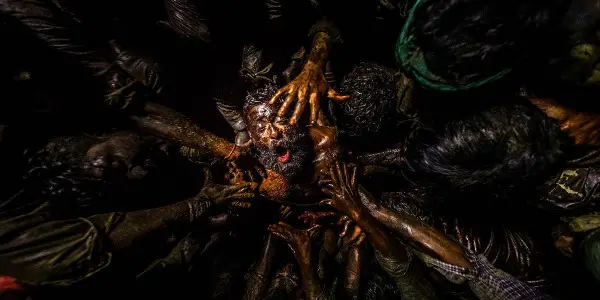
Amid crowd shots and cowardly cretins, Pellisser’s film deftly uses its 90-minute runtime to pace out the carnage, which begins with a prologue of grunting acapella (thrilling) and culminates in a sort-of muddy Cirque du Soleil act (also thrilling, if you ignore the unnecessary coda). There’s a lot of window dressing to pad out the narrative until we reach that climax, but any tangent on chicken-stripping or half-assed dwelling on poverty politics is papered over by the sheer audacity of Jallikattu’s choreographed sequences.
Timed to a rollicking caveman-era score and filmed with a noticeably high frame rate, images of flaming torches invade the screen and drown out whatever fleeting calm precedes the storm. It’s this ‘calm’ that can sometimes enervate: the village inhabitants go at each other full throttle in high-decibel shouting matches, so the audience are never given time to keep that looming migraine at bay. The talk of the townsfolk should prime us for more mayhem; instead it injects us with an alternative, less thrilling sort of adrenaline.
Really though, in spite of these distractions, the director has one thing on his mind: conveying the bestiality of mankind—emphasis on ‘man’—through the medium of water buffalo. This village’s group of macho-masquerading men manage to turn the hunt of an escaped animal into a bodycount bonanza. We all know that men are less feral than wild animals. What Pellissery’s Jallikattu presupposes is…maybe they aren’t? Jalikattu begins with the eyes of savages opening up to a new day, and ends with those eyes being shut forever. The moral story is simple: any suggestion that humanity can sustain its purported sophistication is, well…a load of bull.
The Personal History of David Copperfield (Armando Iannucci)
Paddy Wilson: In Richard Curtis‘ 2013 film About Time, Bill Nighy, clutching a Dickens novel, smiles, ‘This is so brilliant. Dickens is so good on actual jokes.’ Take the 1850 novel David Copperfield, written by said author who’s good on jokes, add the satirist writer-director Armando Iannucci to direct an adaptation, and you’ve got The Personal History of David Copperfield, a film not only good on jokes but also on optimism, levity, and joy. In other words, you’ve got yourself a delight.

The Iannuccian brand of comedy is a well-known and well-loved formula. From the 90s TV show The Day Today, to the 2000 and 2010s The Thick of It and Veep, Iannucci (with co-writer Simon Blackwell) is a political satirist, showcasing the incompetence and cynicism by those who handle the country’s budgets. But with Copperfield, Iannucci throws off the cloak of cynicism in favour of a Victorian waistcoat of sincerity. David Copperfield has a nearly constant lightness and an always constant charm, moving briskly from scene to scene (I suppose one has to when adapting a 600+ page novel) with a sense of fun and grace, not unlike the kite of Hugh Laurie‘s Mr Dick, cheerily floating on the breeze.
Laurie, as the unfailingly pleasant mentally ill Mr Dick, steals each scene he’s in. Trouble is, there’s so much scene stealing going that all involved are liable to be labelled thieves. The duo of young ‘Davey’ Copperfield (a wonderful Jairaj Varsani) and housekeeper Peggotty (Daisy May Cooper, equally wonderful) get the gags rolling from the off, making one wonder whether Dev Patel, our titular grown David Copperfield, can keep our attention in the same way for the rest of the film. He does, with charisma to spare.
Like every English teacher when it comes time to put on a film adaptation hopes, Iannucci’s film should resonate with the young as well as the old. It helps that the cast look and sound like Modern Britain, reflective of The Times We Are Living In, but it’s ultimately David story, as modern as any other (minus the top hat and tails), that is relatable to all: ultimately one of status anxiety. With The Personal History of David Copperfield, Iannucci bypasses the turgidity associated with weighty historical adaptations and the cynical brand of comedy associated with himself, heading directly for sincerity and levity. Like Mr Dick’s kite floating high above the Trotwood fields, it soars.
Rose Plays Julie (Christine Malloy & Joe Lawlor)
Alistair Ryder: One of the benefits of film festivals is the ability to go into the vast majority of films with no pre-conceptions, often knowing nothing but the title before watching. This is a luxury that I can only imagine will be near impossible to sustain when Rose Plays Julie releases theatrically, but the point remains: this may be a straightforward character drama, but even the simplest synopsis will effect how powerful the revelations about these characters are when unfolding onscreen.
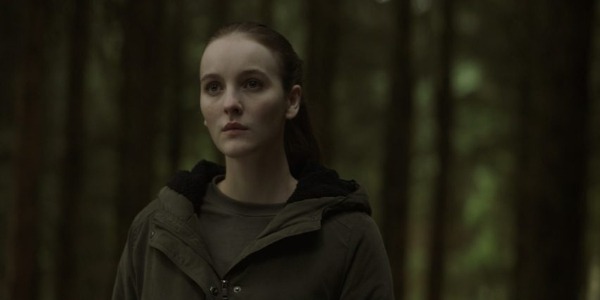
But as I need to give a synopsis, I’ll do it in the vaguest possible terms. Rose Plays Julie introduces us to Rose (Ann Skelly), a veterinary student in Dublin who has been given the name and number of the birth mother she has never met. This is Ellen (Orla Brady), a character actress and mother of a teenage daughter she had a few years after Rose, or Julie, as she was briefly named by the mother who gave her away. Initially, Ellen doesn’t want to meet her daughter after so many years, but reluctantly, she agrees to speak – and unearths past traumas as she gives Rose the next piece of information she needs, the location and identity of her father.
Christine Malloy and Joe Lawlor’s film is one of the best screen depictions of the internal struggle of being adopted, perfectly realising a character’s permanent sense of existential displacement, and constant worries that she’s not living the life she was intended for. Skelly’s performance is subdued, withholding any semblance of emotion as it becomes clear she believes she’s merely being playing a character her entire life – and that she’ll similarly need to act and hide any trace of herself if she wants to meet a father who doesn’t know she exists.
To go into greater depth would be to spoil the sheer emotional weight the film carries, but Malloy and Lawlor deserve additional credit for taking this story into a more traumatic direction and handling it with sensitivity, packing the punch this material needs without ever veering into exploitation of Rose’s vulnerable mental state. I was absolutely floored by this film, and it’s the kind of film festival revelation that makes returning every year all the more worthwhile.
Saint Maud (Rose Glass)
Alistair Ryder: Rose Glass’ directorial debut is a striking and sure to be controversial psychological thriller; a nerve wracking depiction of a young nurse’s crisis of faith pitched somewhere between First Reformed and the gory self discovery of Julia Ducorneau’s Raw. I can only assume the film’s detractors will be concerned by the way Glass exploits the frail mental state of her protagonist, indulging in her increasing deterioration without any sign of catharsis. But this is, unfortunately, very much a trope of this genre – and at just 80 minutes, Glass manages to use this to explore themes of religious misinterpretation, grief and trauma in a way Ari Aster has repeatedly failed to do in 150.
The excellent Morfydd Clark stars as in the semi-titular role; a nurse who has been fired from a hospital job due to a grave accident, and has taken up a new identity to resume work as a private carer. The older woman she’s caring for is Amanda (Jennifer Ehle), who is slowly dying, and Maud uses this as a chance to save her soul from eternal damnation, due to concerns about her sexuality. She starts interfering in Amanda’s life too much, trying to severe ties between her and an escort who makes repeat visits, but it all ends in disaster – and at this point, Maud’s religious feelings only begin to intensify.
Glass’ film couldn’t easily be described as a horror, but she clearly has an understanding for what makes the genre tick; even the handful of jump scares are some of the best crafted in recent memory, appearing suddenly and abruptly as we are plunged deeper into Maud’s damaged mind. Equal credit should be given to Morfydd Clark, who manages to breathe life into a character that could play as an empty, fairly stereotypical character with intense religious beliefs if placed in the wrong hands; there’s empathy within the performance that helps elevate it above mere misery porn (or in one particularly disgusting scene, torture porn), even if Glass is smart enough to know that this story doesn’t have a happy ending. A24 have picked up the film for its US release, and I’ll be intrigued to see how audiences respond. It’s smarter in its narrative, and more coherent in its ideas than Ari Aster’s similarly themed films, but make no mistake, this is one of the most downbeat midnight movies to have emerged in quite some time.
Synchronic (Justin Benson & Aaron Moorhead)
Maria Lattila: Justin Benson and Aaron Moorhead first burst into the consciousness of genre film fans with their 2014 feature Spring which was described as Before Sunrise for horror fans. The dynamic duo followed Spring with The Endless, which acted as a companion for the directors’ first feature Resolution. Benson and Moorhead have an unusually satisfying filmography and the trajectory of their career has been leading them up to this point.
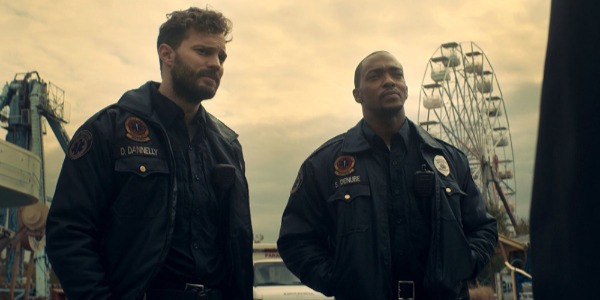
Synchronic might be a little underwhelming at first, but only because all the aforementioned films lean heavily into the mythic and the uncanny. Synchronic is much more commercial and accessible, by design. It’s the inevitable next step in the careers of two extremely talented filmmakers. Fear not though, there is plenty here to enjoy and all the trademark Benson and Moorhead stuff is present. It’s all just a little bigger, a little more mainstream.
Synchronic follows two paramedics who encounter strange accidents and unexplained deaths, all related to a new designer drug called Synchronic. When Dennis’ (Jamie Dornan, in much better form than as Mr. Grey) daughter mysteriously disappears after ingesting the drug, Steve (Anthony Mackie) decides to experiment with the drug and discovers something disturbing.
The greatest joy in Synchronic is that Anthony Mackie gets to shine all on his own. Steve is a meaty character, almost like a blank page that Mackie begins to fill in. Dornan is also fine, but this isn’t really his film, which is a shame because there is buckets of chemistry between him and Mackie. There are some notes about race, which feel like they belong to a different film. They’re not explored enough to justify their presence in a film that is more interested in physics, time and humanity. As with all their film, Benson and Moorhead once again return to ponder what it means to be human and what makes life meaningful.
Whether you connect with the narrative is subjective. It’s an overwhelmingly masculine film, but it’s also funny and heartfelt if you agree to go with its twists and turns. Synchronic blends genres with ease and amps up the ambition. It could have done with some more of the same weirdness that made The Endless so fascinating, but it’s a fine addition to Benson and Moorhead’s filmography.
Two of Us (Filippo Meneghetti)
Becky Kukla: What goes on behind closed doors is both asked and answered in Filippo Meneghetti’s fraught romantic drama Two of Us. Elderly french lesbian couple Nina and Madeleine (Mado) have loved each other their entire lives, but live separately as neighbours for the sake of appearances and Mado’s disapproving family. Their bubble is burst when Mado’s health deteriorates, forcing the bond between them to be tested whilst their secret inner lives are revealed before Mado is ready for it to come out. Starring Barbara Sukowa as the energetic Nina, and Martine Chevallier as the more reserved Mado, Two of Us explores the words we don’t say and the battles that are fought inside our own minds.
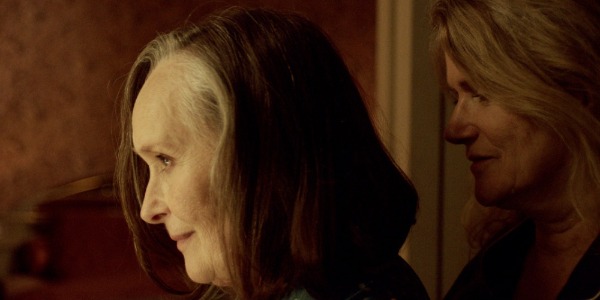
Two of Us is concerned with looking, not speaking. Due to the nature of Mado’s condition, she cannot verbally express her feelings or thoughts, yet director Meneghetti’s focus on Mado’s eyes and face gives the audience all the context they need. Director of photography, Aurélien Marra, embraces this partway through the film with an extended tracking shot into Mado’s face –intense and emotional, the elongated shot draws us further into her torment. It’s a truly powerful moment.
Equally, Nina and Mado, probably from years fostering a secret relationship, seem to be able to communicate without the need for words at all. A fleeting look or a hand on a shoulder is all that is needed to convey a deep well of thoughts and feelings between the two leads. The chemistry between the two experienced actors is electrifying and comforting at once – the unconditional love that they have one for one another feels authentic and true. Meneghetti’s camera compliments this sense of ease with close-ups that show intimacy and slow gentle camera movements mirroring the care the women show to one another.
Perhaps most importantly, what Two of Us captures is something which so much of mainstream media would rather ignore: the desire, passion and sexuality of people above a certain age. Instead of being written off to the role of Grandmothers or widows, Nina and Madeleine are fully realised people in their own right. They holiday, they go out together, they enjoy each others company and (yes, that’s right) they even have sex. It’s a double invisbility in society – being in a lesbian relationship and being over the age of 50 – but Meneghetti brings these characters fully formed to the screen. In it’s short run time of 95 minutes, the audience is treated to a small snapshot of Nina and Mado’s lives and in doing so, Meneghetti has succeeded in creating two characters who lives seem to extend beyond the screen.
You Don’t Nomi (Jeffrey McHale)
Musanna Ahmed: Sitting somewhere between the celebratory homage of Best Worst Movie and the academic interests of Room 237, this documentary absorbingly reframes the conversation around Showgirls even as it suffers from anonymous filmmaking.
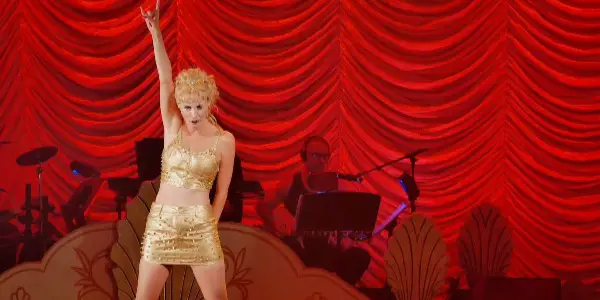
Jeffrey McHale brings together a healthy selection of contributors for his archival retrospective, each of who have engaged with the reception of the infamous Paul Verhoeven flick in various contexts. Amongst them, we hear Adam Nayman, author of Showgirls: It Doesn’t Suck, film professor Jeffrey Sconce, Showgirls screening commentator David Schmader, and performers April Kidwell and Peaches Christ, who fronted a successful stage musical parody. They all share their analysis on where the film fits in any of the consensus categories established at the outset – Piece of Shit, Masterpiece or Masterpiece of Shit.
Listening to their interpretations on everything from the framing of the devil’s head on Gina Gershon’s shoulder to the Magical Negro treatment of the black characters, to the connection between Elizabeth Berkley’s Saved by the Bell character and her Showgirls protagonist Nomi Malone, is an endlessly fascinating exercise that, above all, speaks to the power of art and the open-endedness of it.
Every speaker has a valid take on the cult masterpiece/piece of shit, some that overlap but many that contrast: Verhoeven is a genius filmmaker but a terrible one to any actress he’s worked with, a Razzie-accepting self-aware pro and also a pretentious-as-hell hack, as suggested by the passages he wrote for a book that accompanied the film’s 1995 release.
You Don’t Nomi doesn’t really have any particular agenda, conclusion or point of view besides presenting us with the thoughts of those who know Showgirls inside out, so it’s a bit difficult to understand why McHale was drawn into making what essentially is a compilation of third-party sources, with little input on his own essay besides quirky visual inserts of Showgirls into Verhoeven’s other works.
However, I also accept the argument that this attempt at objectivity is a point in itself, an agreeable one about the needlessness of putting a full stop on art or settling on a general explanation for any work. Even – or, in some cases, especially – when the creator themselves explains their intentions.
I realised early on that my own thoughts on Showgirls would probably not change but they would be enriched upon engaging with the scholarly and personal readings presented here, and I would’ve loved to continue listening to the dissection – few other films could inspire such passionate debate. Showgirls, we might never know you but You Don’t Nomi does a very fine job at helping us understand your imperishable place in cinema.
Stay tuned to Film Inquiry for more reviews from LFF!
Does content like this matter to you?
Become a Member and support film journalism. Unlock access to all of Film Inquiry`s great articles. Join a community of like-minded readers who are passionate about cinema - get access to our private members Network, give back to independent filmmakers, and more.
Alistair is a 25 year old writer based in Cambridge. He has been writing about film since the start of 2014, and in addition to Film Inquiry, regularly contributes to Gay Essential and The Digital Fix, with additional bylines in Film Stories, the BFI and Vague Visages. Because of his work for Film Inquiry, he is a recognised member of GALECA, the Gay & Lesbian Entertainment Critics' Association.













